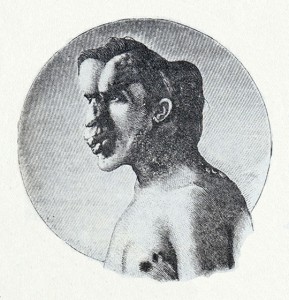Re-examining “the Elephant Man”…
There is another account of Joseph Merrick’s life that suggests he may have been better off if he had stayed in the freakshow, living out his days as one of the most respected showmen of his day. The memoirs of Tom Norman, Merrick’s London manager are most certainly biased, but his version presents a compelling challenge to the more widely-known claim that Merrick was better off in the hospital.
Was the exploitation of Merrick by the well-heeled society folks of his day just another type of freakshow? Possibly one in which Merrick was debased even more than he was in his former life as a respected sideshow entertainer? It’s an interesting question, and one that we here at the Museum find incredibly fascinating. I think that many of us probably share a deep sympathy for Joseph Merrick — a man with what seemed like an artist’s sensitivity and a beautiful heart and mind.
Re-examining ‘the Elephant Man’ (The Public Domain Review)
Nadja Durbach questions the extent to which Joseph Merrick, known as the Elephant Man, was exploited during his time in a Victorian ‘freakshow’, and asks if it wasn’t perhaps the medical establishment, often seen as his saviour, who really took advantage of Merrick and his condition.
“The scenes are among the most heartless in cinema history: a drunken, abusive showman exhibiting the severely deformed Joseph Merrick to horrified punters. David Lynch’s The Elephant Man begins with its lead character being treated little better than an animal in a cage. But it soon finds a clean-cut hero in the ambitious young surgeon Frederick Treves, who rescues the hapless Merrick from his keeper and gives him permanent shelter at the London Hospital. Supported by charitable donations, the victim recovers his humanity: he learns to speak again (in a decidedly middle-class accent), to entertain society guests and to dress and behave like a well-heeled young dandy. Merrick, no more the degraded show freak, reveals his inner goodness and spirituality and dies happy.
Lynch’s movie is based largely on Treves’ sentimental chronicle. But that narrative is merely one version of events – and one that in the end tells us more about middle-class morality than it does about Merrick. There is another story that casts a different light on what happened. The memoirs of Tom Norman, Merrick’s London manager, are surely as biased as Treves’. But as one of the most respected showmen of his day, Norman’s account challenges head on Treves’ claim that Merrick was ultimately better off in the hospital than at the freakshow…”
See the rest here.
Share

